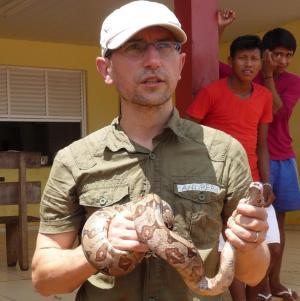You are here
- Home
- blog_categories
- Disputed Landscapes
- The Amazon: It's Time Indigenous Voices Were Heard - Andrea Berardi
The Amazon: It's Time Indigenous Voices Were Heard - Andrea Berardi
15 August 2014

Earlier this year I was in Brazil to present the results of Project COBRA at the 13th International Public Communication of Science and Technology Conference. The conference theme, Science Communication for Social Inclusion and Political Engagement, provided a great opportunity to promote indigenous perspectives, and I hope I made a suitably strong case for the need for policy makers, academia and development practitioners to engage with 'indigenous science'.
As my presentation suggested, although COBRA's participatory, visual and systemic approach has enabled wider stakeholder groups, including policy makers, to recognise the contextual, subjective and non-material dimensions of indigenous life, significant scepticism remains. In addition, there is a clear conflict between the principles behind COBRA's approach and the demands of policymakers for empirically validated information, which requires an imposition on the type and process of data collection, analysis and positioning in the public sphere.
All too often today, the dominant national and international environment and development paradigms focus on the commodification of nature. The policies that result, such as Payments for Ecosystem Services and Low-Carbon Development Strategies, tend to override alternative conceptions of development, often held by the very minorities or indigenous peoples who live in the areas where nature's 'services' are being considered for trade. As a consequence, the management of natural resources is rarely pursued in accordance with these groups' own understanding of nature and development or in ways that do not erode cultural identity.
Over time, and as a result of colonial legacies, the reorganisation of indigenous peoples' spaces, beliefs and interactions with their natural environment, together with the systematic manipulation of discourses around environmental problems, have promoted the interests of non-indigenous stakeholders. When indigenous perspectives are considered - if they are considered at all - they are presented as singular and simplistic. As a result, stereotypes of indigeneity -which tend at best to portray indigenous communities as 'guardians of nature' or, more frequently, as 'inefficient exploiters of natural resources' - remain dominant.
Public platforms for the presentation and discussion of indigenous solutions to global environmental challenges are rare, if non-existent, and alternative ideas on how to manage natural resources often remain hidden within indigenous communities. Seldom, if ever, do they have the opportunity to debate their community challenges and solutions, and to exchange their practices within a multi-actor arena. Direct public engagement with indigenous practices could, however, allow a wider audience to reflect on what it is to be indigenous, helping to break down stereotypes and applying pressure on policy makers to adopt different, non-mainstream perspectives to global environmental challenges. And, beyond public engagement, fostering networks directly amongst indigenous communities would allow them to perform and reinforce their own identities.
Working in the Guiana Shield region of South America, Project COBRA has shown that the bottom-up engagement of indigenous communities within the recording, analysis and dissemination of information has significantly enhanced their potential for autonomy and self-governance. It has enabled them to engage in negotiations with a range of stakeholders, including international policymakers and funding bodies, over local development priorities. The paper on which my presentation was based argues that as the group with the most to lose if their territories are overexploited, indigenous communities should control how information about these territories is collected and disseminated.
To date, others have primarily controlled this information. Both those - such as resource extractive corporations or agribusiness - who aspire to undermine indigenous communities' self-determination, and those - such as NGOs and us in academia - who aspire to speak for indigenous communities. And both groups are sometimes guilty of 'distorting' the information, whether consciously or not. Even within Project COBRA's work the content of the materials produced by indigenous communities has occasionally been questioned if it failed to promote the agenda of particular non-indigenous institutions. Indeed it has sometimes been a real battle to prevent non-indigenous stakeholders from exerting pressure to manipulate the message, and to ensure that indigenous communities record and share their own solutions to challenges, and their aspirations for the future.
Recently I acted as Academic Consultant on the OU-BBC co-production I Bought a Rainforest. I was thrilled that I managed to steer the direction towards promoting community engagement and control rather than employing the neo-colonial attitude to conservation and development that is so common in foreign interventions within the Amazon.
Millions of dollars are being mobilised in the fight against climate change, on poverty alleviation, biodiversity conservation, education and health, but if indigenous communities are not allowed a say on how the money is spent, there is the real risk that it will be misdirected, forcing communities down a development route that may not be of their choosing.
It's time indigenous communities were allowed to take control of the messages that are told about them. Project COBRA, through its Indigenous Mediagate platform, is an example of indigenous communities taking control and presenting their own stories and perspectives. The messages might not be pretty, they might not always be what 'we' want to hear, but they are theirs.
Andrea Berardi is a lecturer in Environmental Systems with qualifications in ecology, nature conservation and environmental sciences. He is currently a co-investigator on Project COBRA, a -1.9 million EU project promoting indigenous solutions to emerging challenges in the Amazon. An edited version of this post first appeared in the ID@OU e-newsletter.
Share this page:
Contact us
To find out more about our work, or to discuss a potential project, please contact:
International Development Research Office
Faculty of Arts and Social Sciences
The Open University
Walton Hall
Milton Keynes
MK7 6AA
United Kingdom
T: +44 (0)1908 858502
E: international-development-research@open.ac.uk
.jpg)